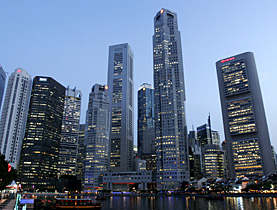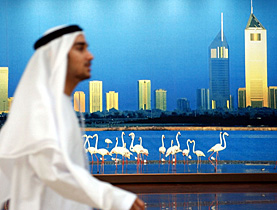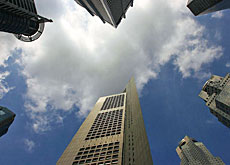Banks look east to recover wealth

Swiss wealth managers are hoping that Asia can breathe life into an industry that has been battered by recent asset erosion and tax-evasion scandals.
The flow of offshore assets, especially from the United States, is dwindling away, but Swiss banks are well positioned to take advantage of the fastest growing wealth market in the world.
The Swiss private banking industry had already begun to shift its focus to onshore activities in prosperous regions before it had felt the full force of the US and European assault on tax havens.
UBS pulled out of offshore banking from the US after losing a lawsuit brought by the Internal Revenue Service (IRS) while other Swiss banks have either followed suit or reduced their activities.
But UBS chief executive Oswald Grübel recently told the Wall Street Journal that lost revenues “can be made up over time through emerging markets, in Asia and the Middle East.”
Despite having lost its mantle as the world’s leading wealth manager, according to researchers, UBS is dominantly placed in Asia, head and shoulders over its rivals.
Singapore-based fund manager Calamander Group estimates that UBS holds $100 billion (SFr104 billion) of the $640 billion in wealth managed by private banks in the Asia Pacific region. Credit Suisse comes fourth in the list with $50 billion in assets.
Money makes money
And there appears to be plenty more wealth on the horizon despite assets taking a huge hit in the recent financial crisis.
The Boston Consulting Group believes the region will generate 9.5 per cent per annum growth for the next five years compared to a global wealth creation average of four per cent.
An annual report by Merrill Lynch bank together with consultancy group Capgemini predicts that Asian millionaires will hold more wealth than their European counterparts by 2012.
Asia has advantages over wealth rivals such as Russia, the Middle East and Brazil, according to Calamander Group chairman Roman Scott.
“Asia-Pacific has a much larger demographic base and a more diversified wealth base than commodities,” he told swissinfo.ch. “This has been the place to be for the last six years. You must be looking at 50 to 60 per cent of future growth of the market situated in the region.”
Observers also predict that much of the wealth currently managed in Europe or the US will return to Asia as assets pass to the next generation and locally based banks gain in stature.
“Because the US and Europeans were already established in the game, it was prestigious to have an account there. But that has diminished because of the achievements and self confidence in Asia,” Kees Stoute, managing director of Swiss-based EFG Bank’s Asian operations, told swissinfo.ch.
Havens shut doors
The financial hubs of Singapore and Hong Kong are the likely beneficiaries of this trend. Bankers in the region are keen to refute fears that the region will also attract illicit funds from tax dodgers who have been flushed out of other havens.
Singapore has been busy negotiating new tax treaties with other countries and expects to be removed from the Organisation for Economic Cooperation and Development (OECD) grey list by the end of the year.
Hong Kong has so far proved more reticent to bow to the international tax crusade. But local bankers hope the Chinese territory will soon reform.
“This is the best place to be because Asia has the best potential and will deliver the fastest growth in the future,” Kees Stoute told swissinfo.ch. “We don’t want the reputation that this is the best place to hide assets.”
Matthew Allen in Singapore, swissinfo.ch
The Asia-Pacific region includes China, India, Japan, Australia, Singapore and Hong Kong and rapidly emerging economies such as Indonesia, Thailand and Vietnam.
The area boasts the fastest growing economies in the world and the largest populations. As a result, more millionaires are being produced per annum in the region than in Europe and the US.
According to Merrill Lynch and Capgemini, in 2007 the number of millionaires around the world increased by 6% to 10.1 million people. In Asia-Pacific the growth rate was 8.7%, representing 2.8 million “high net-worth individuals” (HNWIs).
Africa, the Middle East and Latin America experienced an even higher growth rate, but each of the regions started from a much lower base. The total wealth owned by millionaires in those regions represented a fraction of the 27.8% share of global HNWI assets held in Asia-Pacific.
The wealth of the wealthy increased by 9.4% in the same year to $40.7 trillion. In Asia-Pacific, millionaires saw their assets blossom by 12.5% to $9.5 trillion.
However, all regions of the world were hit hard by the financial crisis last year, with assets falling steeply.
According to Boston Consulting Group, the number of millionaires in the world at the end of 2008 was nine million. The US have the most with nearly four million, followed by Japan (just over a million) and China (417,155).
Switzerland was eighth on the list with 222,027 millionaires. However, Switzerland does boast the second highest density of millionaires per capita with 6.6% of the population boasting a seven-digit bank account.
Some 8.5% of Singaporeans are millionaires, the most per capita in the world.

In compliance with the JTI standards
More: SWI swissinfo.ch certified by the Journalism Trust Initiative





You can find an overview of ongoing debates with our journalists here. Please join us!
If you want to start a conversation about a topic raised in this article or want to report factual errors, email us at english@swissinfo.ch.